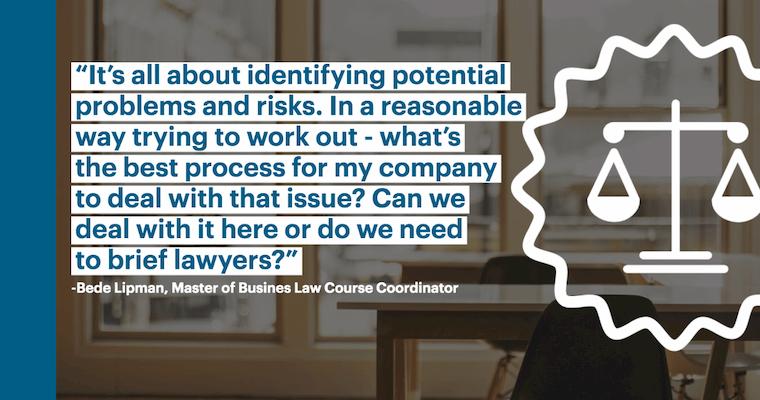Business law broadens your horizon. Whatever industry you’re working in, a business law degree gives you the potential to add value to your business, while opening doors and accelerating your career progression.
You'll be surprised by how sought-after these specialised skills are and by the opportunities available to graduates.
You may be wondering what you can do with a business law degree like SCU Online's Master of Business Law. The answer? You’ll be able to think like a lawyer while viewing the world through a corporate lens – you can reduce risk and uncertainty.

What is a business law degree?
Business law refers to the laws that affect the activities of people in a business – whether they are producers or consumers, small businesses or corporations. These laws specify the rights, duties and obligations of people who operate businesses, as well as those who interact with them.
A business law degree is not designed to make you a lawyer, but rather to enable you to safeguard your business and your personal interests.
It gives you the ability to manage a range of business risks, so you can confidently protect and improve your business' bottom line. It also positions you to understand the impact that new and emerging laws can have on your business, and then adapt to meet those opportunities and challenges.
SCU’s Master of Business Law is a postgraduate degree for people who don’t already have a legal qualification, but whose decisions have legal consequences.
If you are wondering what you can do with a business law degree, the following overview will help you decide if this degree is for you.

What do you study in a business law degree?
Southern Cross University’s postgraduate business law degree gives you a deep understanding of your legal obligations in business. The topics covered can be customised to suit your business law career options. Let’s take a look at three of the most popular topics.
Intellectual Property Law
Intellectual property law is very similar to property law, except that the property under this microscope is a bit more intangible.
Copyright
One example of intellectual property or IP law is the © for copyright which is often used to protect creative works. Earlier this year, a five-year IP law case determined that Led Zeppelin’s 1971 song ‘Stairway to Heaven’ did not breach the copyright of an earlier song from a band called, Spirit.
Patents
Another core area of IP law is patents, which prevent others from making, using or selling an individual’s or organisation’s inventions. Patents are particularly important for the protection of tech disruptors' core innovations, such as Google’s Page Rank, Dropbox’s folder synchronisation or GoPro’s wearable camera.
IP in technology
IP also refers to the systems, processes and software that give businesses a competitive advantage. Technology often makes it easy to see and copy that IP, creating big risks for organisations.
Recently, two employees quit their jobs at IPC Global, a company that makes testing materials for asphalt and construction supplies. On their way out the door, they copied IPC Global’s software and gave it to a programmer in a new company they founded, called Pavetest. In the case of IPC Global Pty Ltd v Pavetest Pty Ltd (No 3) (2017) FCA 82, the Australian Federal Court found that they had infringed copyright even though the programmer used only 800 out of IPC’s 250,000 lines of code.
In addition to paying court costs and damages, Pavetest was ordered to stop selling their software and to destroy it – a very costly way to test the Australian legal system.
IP impacts industries such as publishing, journalism, web development and technology. Industries where a business law degree will be an asset abound.
Contract Law
How many executive business leaders or entrepreneurs have signed a contract that came across their desk and never looked at it again? According to SCU Online Master of Laws (Business Law) and Master of Business Law Course Coordinator Bede Lipman, it happens more often than you may think.
“I practised as a solicitor for 25 years, and a lot of the business people that I dealt with, the contract went in the bottom drawer. It was never looked at,” says Lipman.
Lipman explains that it’s not unusual for contracts to be looked at in detail only when a problem arises, like a delay in work or payment. Even then, most managers don’t know where to look in the contract for the answers they need, and they have to turn to a law firm.
“I think the great advantage for people doing advanced contract law, is that they'll learn what constitutes a binding contract and how to read the words of a contract in terms of risks and responsibilities,” says Mr Lipman.
Contract law also reveals how agreements can be binding, even without actual written contracts.
In the case of Musumeci v Winadell Pty Ltd (1994) 34 NSWLR 723, a shopping centre (Winadell) agreed to discount the rent of a tenant. Musumeci (the tenant) was a fruit shop that objected when another fruit-selling retailer opened in Winadell’s shopping centre.
Among other things, the judge held that the rent discount was binding because Winadell received the “practical benefit” of having a fully let shopping centre. In the same way that a fruit-selling competitor was bad for Musumeci’s business, empty stores were bad for Winadell’s business.
No doubt this is a precedent that will be relevant to many landlords during the COVID-19 pandemic. Understanding contract law is critical for business managers in the housing, construction and other commercial sectors.
Consumer Law
Australian Consumer Law applies to all businesses that sell or provide services to consumers. It provides every consumer in Australia with protection from misleading practices, unconscionable conduct and unfair terms in contracts. According to Schedule 2 of the Competition and Consumer Act 2010, it’s federal law that applies to all states and territories – and therefore all businesses.
So aside from research skills, the ability to read and interpret consumer law is in high demand. Consumer law quickly rose to the top of mind for many businesses when COVID-19 restrictions prompted consumers to seek refunds for travel, events and gym memberships – all at once. The Australian Competition and Consumer Commission reminded businesses that “failure by any business to honour its cancellations or refunds policy may constitute misleading conduct under the Australian Consumer Law.”
Heinz found itself on the wrong side of consumer law because its packaging for children snack read “99 per cent fruit and veg.” The treats were actually more than 60 per cent sugar. The packaging was deemed to have misled consumers into thinking the contents were healthy.
Consumer law often protects the public interest and holds businesses accountable for how they represent themselves in advertising and marketing. In today's world, where travel and other events that are affected by contracts are uncertain, a business law degree can not only help protect your business but also boost customer confidence. That can make it more likely that your customers will do business with you again.
What job roles/industries benefit from a business law degree?
SCU Online course coordinator Bede Lipman points out that anyone with a business law degree has the potential to add value to their business. “It's all about identifying potential problems and risks. In a reasonable way trying to work out - what's the best process for my company to deal with that issue? Can we deal with it here or do we need to brief lawyers?” Being able to answer those questions can save time, money and a lot of stress.

So, what jobs can you get with a business law degree? Here are some business law job opportunities.
HR
In addition to employment laws, human resources (HR) specialists are at an advantage if they know business law. Most recently, COVID-19 has highlighted HR as a place for business law jobs as working from home becomes the new norm.
Well-prepared HR managers have responded to remote working by asking employees to provide photos of their home workstations. These images can reveal potential IP law risks, such as devices connected to a home Wi-Fi that don’t have adequate security settings – a common weakness in printers. In addition to opening up the office virtual private network to cyber threats, these devices can also store copies of sensitive documents when they are printed.
HR staff can also use their knowledge of the law to support staff affected by illness who need to be redeployed to another role.
Salary
The business law job outlook for HR professionals is healthy, with workplace relations officers earning between $120,000 and $140,000 per year. HR managers can earn a similar salary, and there’s a range of specialisations around employment laws, workplace relations and occupational health and safety.
Marketing
One of the key elements of marketing is the communication and promotion of products and services to consumers. A detailed understanding of consumer law helps reduce risk, making this a popular business law degree career. Another area of business law that is particularly important in marketing is contract law.
At its most basic level, a contract needs an offer (usually from the business) and acceptance (usually by the consumer). Knowing what constitutes an offer, as well as when and how it is accepted, can be critically important for marketers.
Salary
Marketing managers can expect to earn between $100,000 and $120,000 per year. A business law degree can also lead to more specialised roles such as that of a regulatory affairs officer, who are tasked with developing policies for products and ensuring compliance in different global regions.
Finance
The Royal Commission into Misconduct in the Banking, Superannuation and Financial Services Industry revealed many shortcomings in the finance industry. It’s fair to say that both businesses and employees needed to improve their relationships with regulators and the law. While a lot has happened since Commissioner Kenneth Hayne delivered his final report, there’s no doubt that embarking on a business law degree would be beneficial for anyone working in finance.
Today, when we are seeing major issues affecting the finance world due to the effects of the global pandemic, an understanding of the legal implications of all these challenges is vital. Knowing how to stay ahead of the game in finance is an asset, as is possessing the legal knowledge to back up your decisions.
Salary
A key business law job in the finance sector is the compliance manager, who oversees the policy and procedures that ensure compliance with regulations. Compliance managers can expect to earn between $100,000 and $150,000 per year.
Media
IP law has traditionally been an important concern in the media industry. Aside from imposing on the copyright of creatives, there are many intricacies around who actually owns the IP. With many programs heading online, a potential minefield of legal challenges awaits anyone who owns a copyright or patent. Being able to negotiate these issues successfully places your business in a strong position.
Salary
The media landscape is evolving rapidly from a centralised to a decentralised model. Instead of working for media companies, media managers are more likely to work for large organisations that host their own media channels. Communication and media managers in such organisations can expect to earn between $80,000 and $130,000 per year.
Politics
A business law degree opens doors to job roles in local, state or federal government as well as the defence sector. Many of the organisations in these areas have been established by an act of legislation and have compliance departments to ensure that legislation is interpreted and applied effectively.
If your career should take you beyond the public service and into representation in a council or parliament, you’ll be grateful for having the ability to think like a lawyer. In addition to having the ability to read and understand contracts and legislation, you’ll also be more effective in conducting negotiations.
Contracts can be a minefield. An example is how procurement regulations were addressed when contracting for personal protective equipment (PPE) during the global pandemic. By relaxing the rules, many items purchased by the UK government were substandard.
Salary
Policy officers and advisors in government departments can expect to earn between $80,000 and $110,000 per year, while contracting managers in the same area can expect to earn $110,000 to $140,000 per year.
Business owners
SCU Online’s Lipman recommends the elective course Advanced Contract Law to all business owners. “Identifying what makes up a contract and the trigger points and risks in contracts puts people in good stead for not entering into bad contracts,” he says.
Many people have established independent businesses, and the legal knowledge you gain in a business law degree will ensure you have robust business processes in place.
Another business law job opportunity is to establish yourself as a management consultant. The specialist skills from a business law degree will give you an edge over others and open up opportunities to work in a range of commercial areas giving expert advice.
Salary
Business owners are in the fortunate situation of being able to set their own salary. A business law degree will not only increase their value to the business but potentially reduce costs and losses in other areas. In this way, they can increase both their own salaries as well as their employees’ salaries.
Procurement
Specialists in procurement need highly developed commercial and negotiation skills while being focused on financial savings and risk reduction. With a deep understanding of contract law, they could respond faster in negotiations and flag risks before contracts are signed. By demonstrating these skills, procurement specialists are more likely to move faster along their career path to becoming supply chain managers.
Salary
Procurement specialists can expect to earn between $90,000 and $130,000 per year, while supply chain managers can expect to earn between $110,000 and $160,000 per year.
Can I be a lawyer if I earn a business law degree?
The short answer is no. To become a lawyer, you’ll need to complete a course of study that meets the requirements of legal practice boards around Australia, such as Southern Cross University's Bachelor of Laws. But what you will get from earning a Master of Business Law is legal knowledge that you would only otherwise get in law schools.
As SCU Online’s Lipman suggests, you’ll be able to think like a lawyer and rely less on legal services. “And that is: What are the facts? What are the legal issues? What is the law, and then how do I resolve a particular issue in the context of the legal outcome that is likely to happen? So, it's a frame of reference and thinking that I think is really valuable,” says Lipman.
How will a business law degree benefit my career?
A business law degree will not only validate your experience in business but also enable you to take advantage of economic opportunities. You’ll be able to identify risks early and clear obstacles, delivering more value to your organisation. Whether those risks are in contracts, processes or elsewhere in the business environment, you’ll have the capacity to respond faster with solutions that save time, effort and money.
Study SCU’s Master of Business Law
SCU offers a 100 per cent online Master of Business Law, giving you the flexibility to study while you work. You can study when you want, where you want and continue to work throughout the course. That’s not only good for limiting your social isolation – you’ll also benefit by being able to apply your learnings immediately. Learn how the Master of Business Law degree can help you today.







